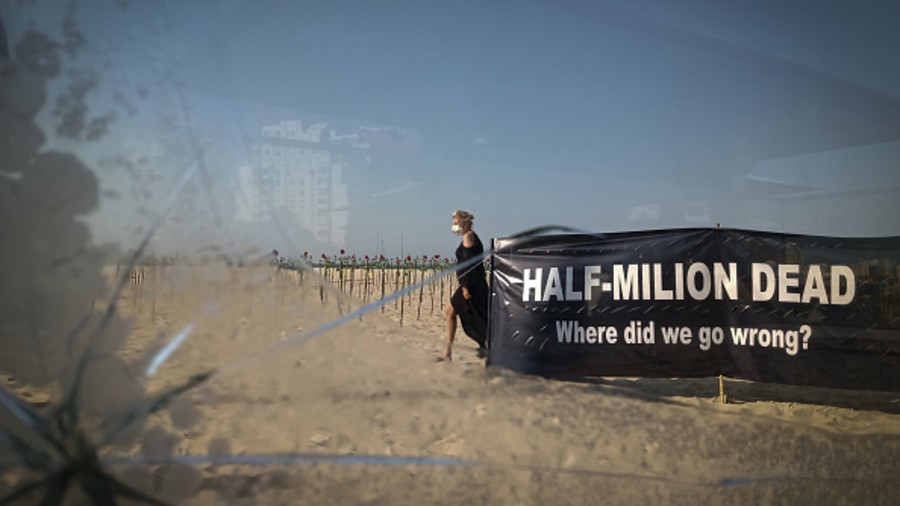Brazilians were recovering from Carnival in the heady days of February 2020 when the first known carriers of the new coronavirus flew home from Europe, planting the seeds of catastrophe.
In Brazil, Latin America’s largest nation, the virus found remarkably fertile ground, turbocharging the outbreak that has turned South America into the hardest-hit continent in the world.
Brazil recently surpassed 500,000 official Covid-19 deaths, the world’s second-highest total behind the US. About 1 in every 400 Brazilians has died from the virus, but many experts believe the true death toll may be higher. Home to just over 2.7 per cent of the world’s population, Brazil accounts for nearly 13 per cent of recorded fatalities, and the situation there is not easing. President Jair Bolsonaro has led a strikingly lackadaisical, dismissive and chaotic response to a coronavirus crisis that has left Brazil poorer, more unequal and increasingly polarised. Social distancing measures have been spotty and badly enforced, the President and his allies have promoted ineffective treatments, and for months the government failed to acquire a large number of vaccines.
“As a Brazilian, it’s appalling to see the throwback following three decades of health achievements happening so fast, with devastating consequences,” said Marcia Castro, the chair of the department of global health and population at Harvard University.
As the virus began spreading from large cities to remote corners of Brazil last year, it took an especially high toll in the Amazon region. By January, patients in the state of Amazonas were suffocating to death after the government was late to heed warnings about oxygen shortages.
Now as the country struggles to vaccinate people, the region’s isolated villages, deep in the rainforest and often accessible only by river, still present a unique challenge.
Bolsonaro has told Brazilians repeatedly that they had nothing to fear. The social distancing, lockdowns and travel restrictions that became the norm elsewhere were wild overreactions that would devastate Brazil’s economy, he warned.
“In my particular case, given my history as an athlete, should I become infected, I would have nothing to worry about,” Bolsonaro said in March of last year. “I wouldn’t feel a thing, or at most, it would be a measly cold, a little flu.”
(He later tested positive for the virus and appeared to have only mild symptoms.)
That cavalier attitude alarmed doctors in Brazil, which has a solid track record of finding innovative solutions to vexing health problems.
Bolsonaro fired his first health minister in April of last year, after their disagreements over virus containment became public.
The next minister lasted barely a month, unwilling to abide by Bolsonaro’s effusive endorsement of hydroxychloroquine, an anti-malaria pill that has not been shown to effectively treat Covid-19.
Then the President put Eduardo Pazuello, an army general with no background in health care, in charge of the ministry.
He has been faulted by lawmakers for allowing the outbreak to spiral out of control this year, pushing the health care system to the point of collapse.
Even after all the hard lessons that have been learned and adjustments that have been made, hospitals in cities like Campo Grande, in the hard-hit western state of Mato Grosso do Sul, are overwhelmed.
The pandemic abated in the autumn, worsened over the winter and exploded in the spring. Brazil’s official death tally averaged fewer than 400 a day in early November, but soared to more than 3,000 a day in early April — tragedy on a scale few would have predicted.
In recent weeks, the daily death toll has exceeded 2,000, and new cases are surging again.
Dealing with death has become routine for Maurício Antonio de Oliveira, 51, a supervisor at the Grupo Eden funeral home in São Paulo.
But 15 months into the pandemic, he hasn’t got used to the particular viciousness Covid inflicts on families of the deceased.
Open coffin viewings are normal in Brazil, which allows the grieving to say a final farewell. But such funerals are prohibited for Covid victims.
“It’s very cruel because the person with Covid is hospitalised and then you don’t see them anymore,” he said. “They want to see their loved one, but there’s no way.”
By April of last year, many hospital intensive care units were overloaded, leaving families scrambling to secure beds, or even chairs, in packed emergency rooms.
New York Times News Service











